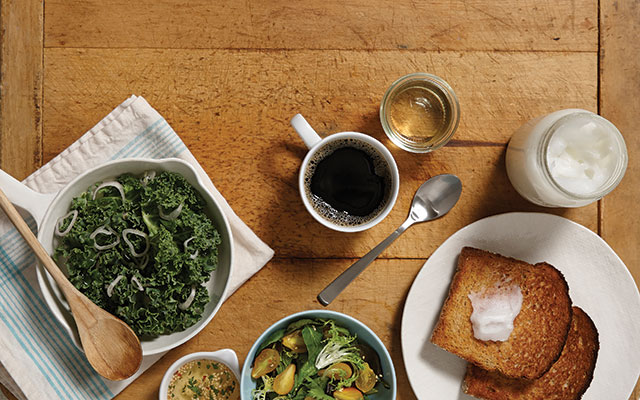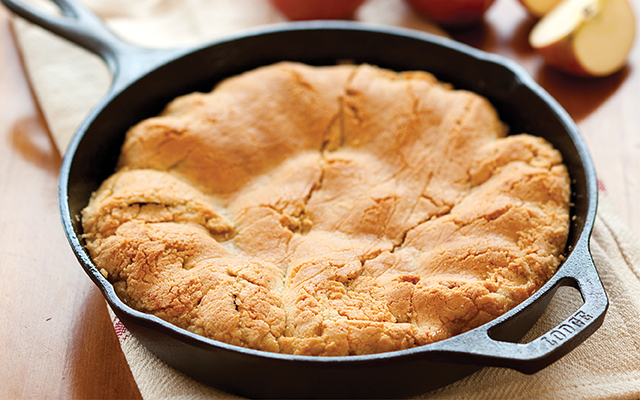The term “superfood” has been bandied about quite a bit recently. But if there is one food that truly deserves the moniker, it’s the mighty coconut.
For decades, coconut oil was maligned for its high saturated-fat content. Now, however, it’s becoming the darling of many health experts.
This is because in the past decade or so, the supposed dangers of saturated fats have been seriously called into question (for more on this, see “A Big Fat Mistake“).
Meanwhile, recent research has also revealed that most of the saturated fat found in coconuts — lauric acid — is a medium-chain triglyceride (MCT), a type of fat particularly coveted for its health and fitness benefits.
“MCTs are fats that digest and absorb more rapidly,” says Adriane Angarano, CN, a Seattle-based functional and holistic nutritionist. “They go directly to the liver to be utilized for energy instead of stored as fat.”
Research shows that eating MCTs helps you burn more calories, satisfy hunger more quickly, and assist in regulating weight better than the long-chain triglycerides predominant in most vegetable oils.
In studies on rats, virgin coconut oil has been shown to reduce blood serum levels of LDL (“bad”) cholesterol while raising HDL (“good”) cholesterol. It also appears to help blood coagulation and improve antioxidant status.
Nutritionists say MCTs can also play a key role in higher-fat, lower-carb diets, which seem to help epilepsy, cancer, and Alzheimer’s patients.
Organic, extra-virgin coconut oil — the gold standard in terms of flavor and nutrition — also has rich anti-inflammatory, antifungal, antiviral, and antimicrobial properties.
Plus, it serves an amazing number of non-edible purposes. In coconut-loving Malaysia, the word for coconut tree translates as “the tree of a thousand uses.” Here are just a few.
Nutrition & Cooking
- Instead of butter, fry or scramble your eggs in coconut oil, and try slathering it on toast.
- Stir a spoonful in your oatmeal or spread on pancakes for a lower glycemic load.
- Making your own granola? Baking treats? Swap in coconut oil instead of typical vegetable oil or shortening.
- Whirl into smoothies for longer-lasting energy and an instant hit of cholesterol-improving lauric acid.
- Even unrefined coconut oil has a relatively high smoke point, making it great for higher-temperature cooking, such as stir-frying or sautéing. Try cooking your dark leafy greens using coconut oil and a little sea salt.
- Make theater-style popcorn by heating kernels in coconut oil in a heavy kettle. Once popped, drizzle a mixture of melted coconut oil and butter over the top.
- As an alternative to a latte or coffee with cream, in a blender combine 1 tablespoon coconut oil, 1 tablespoon unsalted grassfed butter, and 1 cup of coffee until it’s creamy and no oil is floating on the surface, about 20 to 30 seconds. Spike with vanilla or cinnamon, if desired.
- Mash into sweet potatoes or use to cook sweet-potato fries for a rich, nutty flavor.
- When making homemade mayo, replace half the olive oil with coconut oil. Or replace the oil in your favorite homemade salad dressing.
- For a quick treat, melt and mix with dark chocolate to make fudge or bark. Or pour the liquid mixture over a scoop of cold ice cream. It will harden instantly, like on a classic dipped cone.
- Eat it by the spoonful, right out of the jar — a quick supplement and snack combined.
Body Care
- Mix a little baking soda with coconut oil for a quick homemade tooth polish.
- Make a chemical-free deodorant from solid coconut oil, baking soda, arrowroot powder or cornstarch, plus a few drops of your favorite essential oil, such as lavender. (For a recipe, see “Homemade Deodorant: B.O. No More’“.)
- The natural analgesic properties of virgin coconut oil can help take some of the sting out of bug bites, chicken pox, and poison ivy, and aid skin in healing faster. Coconut oil is also a natural sunburn soother.
- Skip petroleum-based lip balms and create your own from coconut oil, beeswax, and vitamin E. (For a simple recipe, see https://j.mp/c2lipbalms.)
- Massage your hair and scalp with coconut oil prior to shampooing to promote hair health.
- Use as an all-over body moisturizer to smooth dry skin and add sheen. Slather on after your shower, or try adding a few tablespoons to your bath. Great as massage oil, too.
- Use as a shaving cream — great for chemically sensitive folks.
- New parents use coconut oil to help combat diaper rash. Not only does it sooth a baby’s bum, it also contains antibacterial agents that fight infection and promote healing.
General Health
- Consider taking coconut oil as a supportive treatment in preventing and fighting systemic fungal conditions, including athlete’s foot and vaginal yeast infections. The oil’s caprylic acid helps degrade the cellular membrane of the Candida albicans fungus, limiting its ability to colonize.
- To help relieve seasonal allergy discomfort and itch, try rubbing a little oil in your nostrils. It’s also a good immune-system booster and a strong anti-inflammatory, both of which can help ease allergy symptoms.
- For earaches, melt a little bit of coconut oil, cool to room temperature, place in an eyedropper, and put several drops in the affected ear. The oil’s antimicrobial qualities can help fight low-grade infections.
- Anti-inflammatory coconut oil can help canker sores and cold sores heal faster.
- Allow a tablespoon of coconut oil to melt in your mouth, then swish it around for 10, ideally 20, minutes to draw out impurities and moisturize oral tissue. Then spit it out and rinse with water. Known as “oil pulling,” this ancient practice has grown increasingly popular in recent years. Research has shown it effectively combats bad breath and plaque.
- Try coconut oil as an acne preventive. A 2009 study found that lauric acid can kill the bacteria that promote inflammatory acne. Rub a bit onto vulnerable areas.
Household
- Season your cast-iron pan with solidified coconut oil. Coat interior surface, then let the pan sit in a 300-degree-F oven for 20 minutes.
- Create a quick furniture polish by mixing 3/4 teaspoon coconut oil and 1/4 cup lemon juice. First remove dust, then rub in coconut mixture with a clean, soft cloth, and buff to a gleaming shine.
- Combine 1/4 cup of coconut oil with 20 drops of citronella oil for a nontoxic bug repellent.
- Gum in your hair? Unknown sticky substance on the couch? Combine coconut oil with baking soda and rub.
- Use it on your dog to ward off fleas, soothe dry skin, and smooth fur. (Some pet owners also mix coconut oil into pet food for an extra boost of nutrients and healthy fats.)


This Post Has 0 Comments